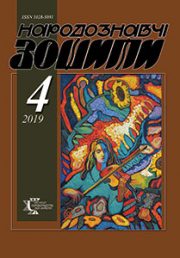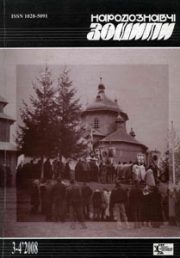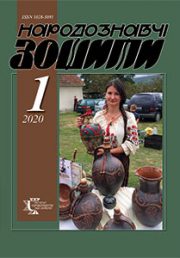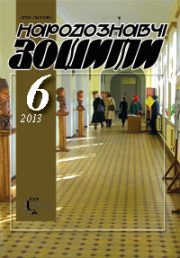The Ethnology Notebooks. 2024. № 2 (176), 274—282
UDK 930(100)”19/20″:341.485-047.275
DOI https://doi.org/10.15407/nz2024.02.274
KOZYCKYJ Andrij
- ORCID ID: https://orcid.org/000-0003-4535-8279
- Associative Professor of The Chair of Modern
- and Contemporary History of Foreign Countrie,
- Ivan Franko National University of Lviv,
- 1, Universytetska Street, 79000, Lviv, Ukraine,
- Contacts: e-mail: kozyckyj@yahoo.com
Abstract. Introduction. Conscious and purposeful denial of genocide in the second half of the 20th century became a noticeable phenomenon of the political life of
many countries of the world. The refusal to recognize the historically established facts of the mass extermination of people was most often manifested through
the denial of the Holocaust of European Jews, the genocide of Armenians in the Ottoman Empire during the First World War, and the Holodomor of 1932—
1933 in Ukraine. The end of the 20th century was marked by the appearance of a significant number of publications denying the genocides in Cambodia,
Rwanda and Srebrenica, political repressions in the USSR, Katyn massacre of Polish military officers in 1940, etc. Thus at the end of the 20th — the beginning
of the 21st century in the scientific environment of Western countries was formed a consensus that denial of genocide should be considered as a separate genre
of political journalism and pseudo-scientific literature, and therefore, a separate subject of research.
At the end of the 20th — the beginning of the 21st Stanley Cohen, Israel Charny, Herbert Hirsch, Michael Shermer, Alex Grobman, Michael Shafir, Tony
Taylor, Lech Nyakowski, and other Western researchers were engaged in the theoretical processing of genocide denial as a scientific problem. Due to their
researcher at the turn of the 20th and 21st centuries were developed methodological foundations and research tools, which are still used in the study of genocide
denial.
The relevance of this article is determined by the possibility of using the conclusions of Western historiography in the field of genocide denial to counter
Russian propaganda as an essential component of the information war waged by the Russian Federation against Ukraine.
The purpose of the proposed investigation is to analyze the current state of the theoretical study of genocide denial in Western historiography.
The object of the research is theoretical studies of genocide denial in western historiography, and the subject — scientific books and articles of leading
researchers of genocide denial of Western countries. The methodological basis of the research is the principle of contextualization in combination with elements
of structural and functional analysis.
Conclusion. Theoretical studies of Western historiography of genocide denial can find application in understanding of the policy of Holodomor denial, which
was carried out by the USSR in the past, and today is used by Russia in its information war against Ukraine.
Keywords: genocide, propaganda, genocide denial, historiography, Holodomor denial.
Received 15.03.2024
REFERENCES
- Dadrian, V.N. (1999). The Key Elements in the Turkish Denial of the Armenian Genocide: A Case Study of Distortion and Falsification. Cambridge; Toronto:
- The Zoryan Institute.
- Cox, J., Khoury, A., & Minslow, S. (Ed.). (2022). Denial: The Final Stage of Genocide. London; New York: Routledge.
- Garibian, S. (2007/2008). Taking Denial Seriously: Genocide Denial and Freedom of Speech in the French Law. Cardozo Journal of Conflict Resolution (Vol. 9, pp. 479—488).
- Lasson, K. (2007). Defending Truth: Legal and Psychological Aspects of Holocaust Denial. Current Psychology (Vol. 26, issue 3—4, pp. 223—266); https://doi.org/10.1007/s12144-007-9013-7.
- Hovannisian, R. (Ed). (1999). Denial of the Armenian Genocide in Comparison with Holocaust Denial. Remembrance and Denial: The Case of the Armenian Genocide (Pp. 201—236). Detroit: Wayne State University Press.
- Theriault, H. (2004). An Analytical Typology of Arguments Denying Genocides and Related Mass Human Rights Violations. Comparative Genocide Studies (Vol. 1, pp. 78—101).
- Cohen, S. (1993). Human Rights and Crimes of the State: The Culture of Denial. The Australian and New Zealand Journal of Criminology (Vol. 26, issue 2, pp. 97—115); https://doi/org/10/1177/000486589302600201.
- Cohen, S. (2013). States of Denial. Knowing about Atrocities and Suffering. Cambridge: Polity Press.
- Charny, I. (Ed.). (1991). The Psychology of Denial of Known Genocides. Genocide: A Critical Bibliographic Review (Vol. 2, pp. 3—37). London; New York:
- Mansell Publishing — Facts on File.
- Charny, I. (1997). Commonality in Denial: Classifying the Final Stage of the Genocide Process. International Network on the Holocaust and Genocide (Vol. 11,
- issue 5, pp. 5—7).
- Charny, I. (2000). Innocent Denials of Known Genocides: A Further Contribution to a Psychology of Denial of Genocide. Human Rights Review (Vol. 1, issue 3, pp. 15—39); https://doi.org/10/1007/s12142-000-1019-6.
- Charny, I. (2003). A Classification of Denials of the Holocaust and Other Genocide. Journal of Genocide Research (Vol. 5, issue 1, pp. 11—34); https://doi.org/10/1080/14623520305645.
- Charny, I., Totten, S., & Bartrop P.R. (Ed.). (2009). Classification of denials of the Holocaust and other genocides. The Genocide Studies Reader (Pp. 519—529). New York: Routledge.
- Charny, I. (2000). Innocent Denials of Known Genocides. A Further Contribution to a Psychology of Denial of Genocide (Revisionism). Human Rights Review (Vol. 1, issue 3, pp. 15—39).
- Parent, G. (2016). Genocide Denial. Perpetuating Victimization and the Cycle of Violence in Bosnia and Herzegovina. Genocide Studies and Prevention: An International Journal (Vol. 10, issue 2, pp. 38—58); https://dx.doi.org/10.5038/1911-9933.10.2.1369.
- Hirsch, H. (1995). Genocide and the Politics of Memory. London: The University of North Carolina Press.
- Shafir, M. (2002). Between Denial and «Comparative Trivialization». Holocaust Negationism in Post-Communist East Central Europe. Jerusalem: Vidal Sassoon International Center for the Study of Antisemitism.
- Taylor, T. (2008). Denial: History Betrayed. Carlton: Melbourne University Press.
- Ankersmit, F. (2001). The Sublime Dissociation of the Past: or How to Be(come) What on Is No Longer. History and Theory (Vol. 40, issue 3, pp. 295—323).
- Novak, A. (2021). How the «Evil Empire» Arose? The Experience of Central and Eastern Europe. Kyiv: Dukh i Litera [in Ukrainian].
- Connerton, P. (2008). Seven types of Forgetting. Memory Studies (Vol. 1, issue 1, pp. 59—71); https://doi.org/10.1177/1750698007083889.
- Nijakowski, L., & Szpociсski, A. (Ed.). (2009). When the Bloody Spot Turns White. Collective Memory as a Factor of Integration and a Source of Conflicts (Pp. 167—191). Warszawa: Scholar [in Polish].
- Nijakowski, L., Machul-Telus, B., Markowska-Manista, U., & Nijakowski, L. (Ed.). (2017). Is Genocide Beneficial? Socio-Economic Consequences of Genocide and Their Presentation in Public Discourse. Bloody Shadow of Genocide. Genocide — Memory, Discourse, Education (Part 2, pp. 92—95). Warszawa: Instytut Wydawniczy Ksiazka i Prasa [in Polish].
- Hovannisian, R.G. (Ed.). (1987). The Armenian Genocide and Patterns of Denial. The Armenian Genocide in Perspective (Pp. 111—133). New Brunswick & Oxford: Transaction Books.
- Shermer, M., & Grobman, A. (2000). Denying History: Who Says the Holocaust Never Happened and Why Do They Say It? Los Angeles: University of California Press.
- Karlsson, M. (2009). A Hoax and a Sham. An Argumentative Analysis Investigating Western Denial of the Armenian Genocide. Lund: History Department at Lund University. Massey, S., Cox, J., Khoury, A., & Minslow, S. (Ed.). (2022). The Bosnian genocide and the «Continuum of denial». Denial: The Final Stage of Genocide (Pp. 113—130). London; New York: Routledge Taylor & Francis Group.







